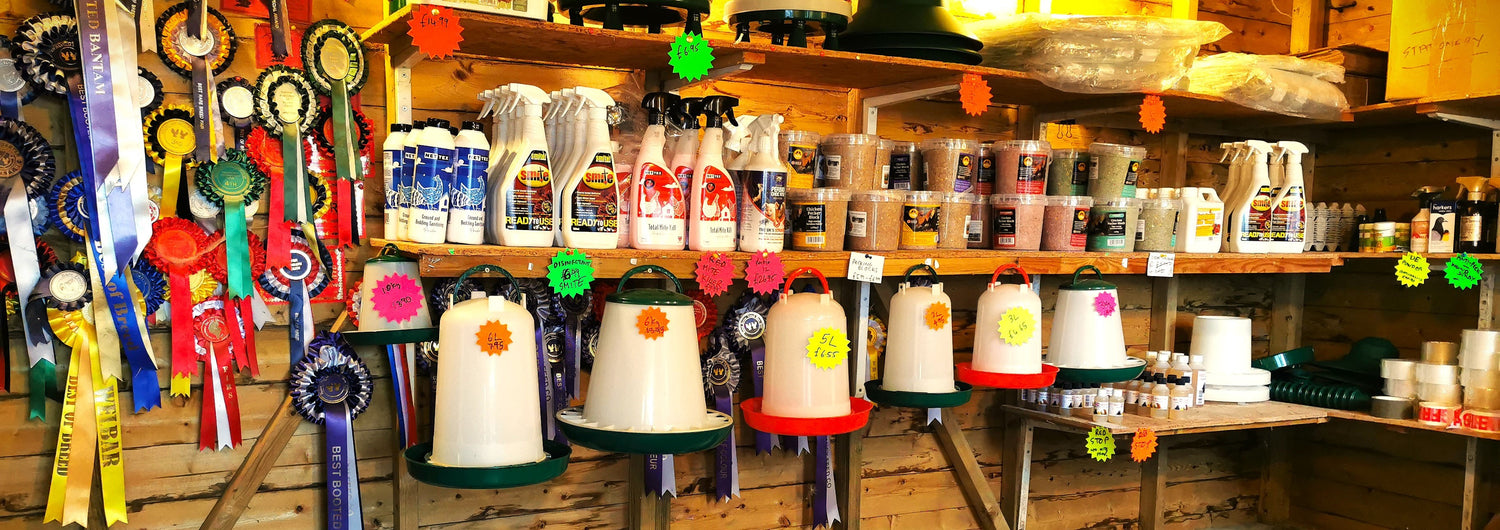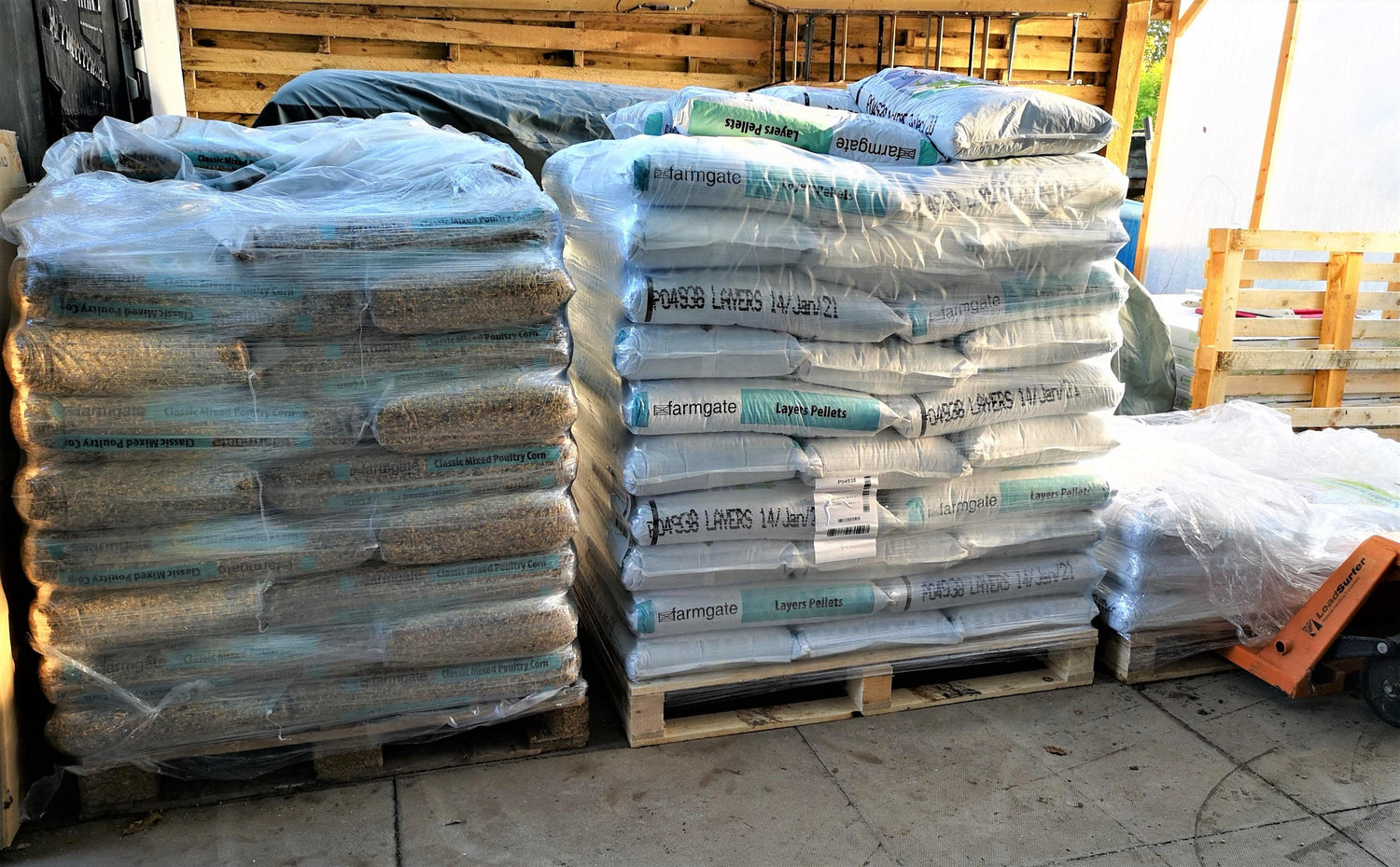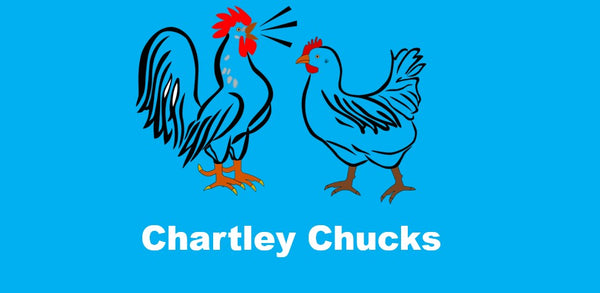
Chartley Chucks
👉Just Click to order
Keep it simple and shop with confidence
Collections via Appointment from Staffordshire ST18 0LD, Delivered items 2-5 days
Quick links
🌟Use the Bird Selector to apply flock discounts🌟
or just Browsing 👇
-

🐔 Chickens for sale - Large breeds
andLarge ready to lay chickens - strictly speaking these are pullets, ie...
-

🏆 Chickens for sale - Bantam breeds
Bantams ready to lay - Bantams are small chickens and generally pure...
-

🍴 Food & Bedding
Our Poultry feed is specially formulated for chickens bred to lay lots...
-

🍺 Poultry Drinkers and Feeders
Chicken feeders, drinkers, automatic door openers and other poultry accessories. Poultry drinkers...
-

🏠 Coops/Housing
Poultry Houses, chicken coops for large and bantam sized birds. We recommend...
-

🏃RUNS and Tarps ⛱
Poultry runs to keep your chickens safe from predators at all times...
-

⚙ Auto Doors and accessories
Auto Doors for Poultry houses. Useful in winter when its darker later...
-

🦀Poultry Health
Chartley Chucks selection of the best products to solve and prevent a...
-

Garden - seeds compost etc
Garden products including seeds, vegetables, plant food, garden composts etc
-

🐶Dogs & Cats
Scientifically formulated Dog and Cat calming products. Dog and Cat worming products, ...
-

🐴Horse products
Equine supplements and stable products. Discover a wide range of equine supplements...
-

💥 Special OFFERS
Special offers, second hand chicken coops, used items and special purchase discounted...
New to the hobby or seeking to expand your knowledge?
First time chicken keeper
Space - the final frontier! Well not for chickens - each bird ideally needs approx 1.5 square metre of run space, less for Bantams (small birds) more for very large birds, eg Brahma.
We recommend walk in runs - if you have ever tried to catch a chicken on your knees in a low integrated house and run - you will know why - Plus the runs are tiny!
House - Chickens are birds - yes I know you knew that - but all birds perch at night, even chickens. Each bird needs approx 15cm (6" on old money) to perch, so a 1m perch (3ft) will support about 6 chickens. Perches should be at least 30cm apart, other wise one row of chickens will have their noses up the others.... well I'll let you work that out.
We size our chicken coops (houses) on that basis.
Food - Layers pellets and layers mash is formulated for commercial laying hens, it has everything a chicken needs nutritionally. Its basically wheat, soya, maize and lots of other ingredients. A chickens natural diet is 60-70% insects really - they will find all sorts of invertebrates naturally in their runs, so they will get a mixed diet. The generally accepted routine is also to feed feed mixed corn late in the day - just chuck some in and they will scratch around for it. Oh and put a little mixed poultry grit in their food (hens teeth). They should have access to layers pellets at all times - this is best achieved using round poultry feeders.
Bedding - Well - they don't lie on a bed as you have learned about - but they do like nesting material in their nesting boxes, it also prevents eggs breaking, and its useful under perches to catch the poo and help with the mucking out.
Basically all bedding used for chickens is horse bedding - whether its chopped straw (swish), Easichick (softchip) or Aubiose bedding etc. Straw will compost quickly, wood chips or shavings won't.
Treats - don't give them anything long and stringy - this can cause crop issues (you can google what a crop is). Best to stick to treats designed for poultry such as pecking blocks, calci worms etc. They may love pasta, tuna, cat food etc - but its not their natural diet!
Maintenance/Mucking out - a common question we get asked is - how often do I muck out - the answer is - well it depends how big the house is and how many chickens you have - sorry cant be much clearer. You can poo pick (don the gloves) for a few weeks then give it a good thorough clean/scrape and disinfect. Plastic coops are much easier than wooden coops to keep clean and mite free (I will mention mites again later). There is no structural maintenance required with plastic/HPL coops, but wooden ones will crack, shrink etc and will require creosote or other insect repellent treatments.
Mites - there are two main predators of poultry - both red! The big red ones (foxes) can get through a very small gap in a run eg 7cm (3"), the tiny red ones (mites) can live in a gap 0.1mm. Mites are pin prick sized, live in tiny tiny crevices where your birds perch and are nocturnal. They don't live on birds (if you have millions in the coop you may find some on a bird). If you don't inspect the poultry house and take preventative measures, you are pretty guaranteed to get mites. If you see peppering of white/grey dots over the surfaces of the coop - you have them. Try running your finger along the underside of perches - if you finger is red - you have them. We stock lots of preventative treatments and lots of "kill em dead" type treatments - just see the website.
For our Starter deals click here
more to follow...
Meet the experts and learn more?
Bird Flu - want to know the latest then click here
Fancy Fowl is back in print - if you are into your Poultry, whether you show them, breed them or just want a more in depth regular read about all things Poultry, then this is for you - click on this link to see their latest subscription offers.
The National Federation of Poultry clubs annual show will be held on Sat December 20th and Sun 21st 2025. Click here for more information
The Poultry Club GB website has a wealth of information about breeds, shows, etc - click here to visit their website
Useful information
All Reviews
Chartley Chucks reviews - reviews of products and site reviews - see how we are doing.
Frequently Asked Questions
What do you have in stock? - our website is updated in real time, so if you can ADD TO CART, its in stock, if its PRE ORDER or SOLD OUT, its out of stock.
Searching for something? eg, What Bantams do you have in stock - please check on the BIRDS - Heritage Breeds page for details
Do I need an appointment? - yes, either make an order then make a click and collect order appointment or scroll down and make a different type of appointment.
When can I collect? - for opening hours see the contact us panel on the main menu
Do you Deliver? - yes shipping on most items England, Wales and mainland Scotland, see our shipping Policy for more details. WE DO NOT DELIVER BIRDS.
Are your Nestera or Easicoop chicken houses fox-proof? Yes we are confident they are we have not received any reports of a fox getting into one of our houses when the door has been closed.
Are your metal runs fox-proof? This depends how well you build them. Foxes usually dig under pens, so if you run the mesh outwards from the sides across the ground a few feet or put concrete slabs all around, that will prevent digging. We use them and they have resisted a badger attempts at access. There is always plenty of mesh supplied and often enough to "double glaze" the lower sections if you feel the need.
Are your Nestera or Easicoop chicken houses red mite-proof? Red mite are tiny, and live in cracks and joints in poultry housing. Plastic coops are made from solid HPL or recycled Plastic, there are very few suitable places for them, unlike wood and felt which provide a great environment for them to live and breed. We recommend sprinkling some Diatom powder around the house when refreshing the bedding, so that any mites are quickly dealt with before they can multiply. HPL is also easy to clean, should you be unfortunate enough to see evidence of mites.
So, while any chicken coop is not red-mite-proof, the Easicoop HPL coops have far less hiding places than any other type and are less prone to them than majority of others in the market. Both Nestera and Easicoop are also very easy to clean.
Our coops are solid walled coops which greatly reduces the risk of red mite infestations residing in between the walls of twin walled coops which have many inaccessible areas ant cant be thoroughly cleaned.
Do the Easicoop chicken houses get cold in winter? HPL is a surprisingly good insulator, it is resistant to thermal shock, even though it is a solid material. The internal temperature of and HPL constructed coop is more stable than a wooden coop would be. Chickens need good ventilation are are perfectly comfortable in temperatures down to minus 20 deg C provided they are not wet and out of strong winds. Our coops are solid walled coops which greatly reduces the risk of red mite infestations residing in between the walls of twin walled coops which have many inaccessible areas ant cant be thoroughly cleaned.
What maintenance is required for the Nestera or Easicoop chicken coops? No maintenance requirements, just clean with a disinfectant, a monthly deep clean. As there are no screw, clips etc, disassembly and reassembly is a very quick operation.
What maintenance is required for Wooden chicken coops? Wood requires a yearly treatment of preservative on the outside to remain waterproof. We recommend cedar oil for domestic use or creosote for agricultural use. The inside either needs very regular spraying with redmite disinfectants and or use of DE powder or the application of lime wash.
Poultry care
Introducing, Feeding and Caring your new Chickens
Transporting and Bird release
The transportation of birds will cause stress. As soon as you get home, remove your birds from their box and put them in the chicken house with the pop hole door closed. Leave for 5 to 10 minutes in the dark, then open the pop hole door. The birds will take some time to emerge, do not stress them more by tempting them with food etc, its best to walk away and watch from a distance. If you have existing birds – please read below.
POL Hybrids
POL Hybrids (16+ weeks) are fully vaccinated and can be mixed with existing flocks from 16 weeks of age onwards with little risk. Hybrids have been reared on layers mash/meal, if offered pellets first, they may not eat immediately so we advise feeding Hybrid starter feed (pellets and mash mixed fed dry). To wean them off mash and onto pellets, simply mix the two together and increase the proportion of pellets gradually. Hybrids should start laying at around 19-21 weeks of age (blue egg layers approximately 25 weeks).
Pure Breeds
- Pure Bred chickens are not vaccinated and must be kept separate from any other chickens for a minimum of 2 weeks as advised by DEFRA. After the 2 weeks quarantine period, you can integrate with other chickens of a similar age or when they are at least 18 weeks old.
- Chicks up to 6-10 weeks old – should be fed on chick crumb dry, simply fill a small feeder and don’t let it run out. Their housing and run (softchip shavings) area must be kept clean, eg smite disinfectant, and dry as much as possible to help prevent a severe coccidiosis infection developing and allowing them to develop natural immunity. Cider vinegar in their water once weekly will also assist their resistance. The addition of vitamins to their water also helps their vigour during the growing process.
- Chicks from 6-10 weeks to POL – can be fed Growers Pellets or chick crumb.
- Chickens from POL – should be fed on Layers or Breeders pellets or mash/meal.
- Birds over 10 weeks are guaranteed for 5 days, younger birds are not guaranteed.
- Bantams should start laying 20-30 weeks, large breeds 30-40 weeks between spring and autumn.
All birds can be given some mixed corn before bedtime to encourage them back into their coops/runs.
Worming and bird mites
We recommend worming your chickens every 6-12 months using 1% Ivermectin, this kills most worms, lice and chicken born mites. Ivermectin applied by drops direct on the skin, one 5ml bottle will treat approximately 40 Hybrid sized birds; (do not eat eggs for 2 weeks following treatment) apply at the rate of 1 drop per 0.5Kg of bird. We can supply this for £7.50 per bottle. If you don’t want to medicate your birds we can also offer Worm count test kits.
Red Mites
We recommend continued use of DE (Diatomaceous earth) in your coops to help prevent a red mite infestation. Should your coop get infested, we recommend Total Mite Kill by Net-Tex and RED STOP. If your birds start to look anaemic, start to refuse to go into their coop at night, or the egg laying rate reduces, this is the sign of a coop infestation.
Auto door product support
If you need support for a Chicken Guard door opener - please contact them direct they offer support/Warranty for 3yrs. Contact - ChickenGuard
To see Warranty information on Nestera Products click here
If you need support for a Nestera door opener - please contact them direct - Nestera | The Planet's Favourite Chicken Coops
If you need support for Easicoop products click here for Warranty information
If you need support for an Easicoop Auto-Defender door opener please see below;
Advice on fitting - contact us
To reset menu language, door calibration etc - please follow the following instructions;
1. Press ENT/ESC for 4 secs
2. Press OK
3. Use up/down to select Reset
4. Press OK
5. Press ENT/ESC for 4 secs
6. Use up/down to select English
7. Follow instructions on screen to set/confirm date/time and to calibrate closed position and open position of the door.
Coop aftercare & Maintenance
1. Chicken houses must be sited on solid level ground and not in contact with soil. We recommend siting on concrete flags or concrete blocks, this keeps a good air flow underneath the house. They must also be placed out of direct sunlight and in a sheltered position, both direct sun and strong winds can damage the coop and is not in the best interests of the poultry housed. Vents should be kept open all throughout the year in the UK to avoid internal condensation, chickens are comfortable down to minus 15deg C as they are covered in a 40 tog duvet.
2. Wooden coops need regular maintenance, they should be treated with a waterproof preservative once a year. We recommend cedar oil for domestic use, creosote is ideal also but is for agricultural use and has health warnings. We do not recommend water based fence paints, these are not sufficiently waterproof. HPL Easicoops and plastic coops do not require any maintenance other than the usual regular cleaning.
3. Metal runs should always be built with the mesh either buried in the ground or spread out sideways for form a fox proof skirt, then covered with earth or concrete slabs. Tarpaulins need to be checked periodically and further fixings used if on exposed windy sites.
4. In severe weather conditions such as snow, rain, hail, wind, thunder and lightening please take extra precautions to secure your poultry house and its occupants against the elements.
Vaccinations
| Vaccination programme for Hybrids | |
| Age | Vaccination |
| 1 day | Mareks |
| 18 days | Infectious Bursal Disease |
| 24 days | Infectious Bursal Disease Newcastles Disease Infectious Bronchitis |
| 30 days | Infectious Bursal Disease |
| 6 weeks | Newcastles Disease Infectious Bronchitis |
| 10 weeks | Avian Encephalomyelitis Newcastles Disease Infectious Bronchitis |
| 13 weeks | Avian Encephalomyelitis Pox Salmonella Newcastles Disease Infectious Bronchitis |
| 15 weeks | Newcastles Disease Infectious Bronchitis |
Directory of Couriers for poultry
https://www.highflyersukcouriers.com/poultry-fowl-prices/
https://www.walkerseurotransport.co.uk/livestock
https://www.uknationalbirdcouriers.co.uk/testimonials
For more choices just google "bird couriers"
or try...
https://www.anyvan.com/
https://findmymanandvan.co.uk/man-with-a-van
Hatching eggs in schools
Hatching eggs in schools
Sadly due to health and age we are no longer operating this service.
About us
Jeff and Jane are a retired couple. During the latter 40yrs of working in the Health Service and Education, we decided to breed and show chickens. This expanded to selling chickens, coops, feed, accessories etc. We are still doing this, but as the years progress we are finding the need for some work life balance, hence why we now only open by appointment on limited days of the week.
-
Contact us
E: chartley.chucks@gmail.com
M/WhatsApp:07736 960835
C: Chat button bottom right.
Open Monday 2pm-4pm, Friday and Saturday 10am - 5pm by appointment.
CPH# 37/198/0317 - VAT#:348233008
Chartley Chucks is within half an hour of Stoke on Trent, Stone, Stafford, Cannock, Lichfield, Burton upon Trent and Newport (Salop). ST18 0LD
What three words - riverboat.skyrocket.bristle
Largest Chicken Coop supplier in the Midlands. Specialising in HPL and re-cycled Plastic chicken coops.













